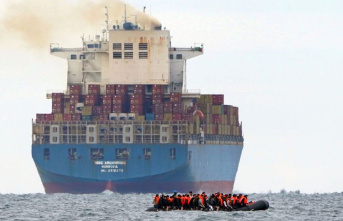the relationship between the European Union and Turkey is a key focus of the German EU presidency. "We need a coherent strategy for Turkey," said German Chancellor Angela Merkel on 1. July in the German Bundestag. The Turkey policy of the EU to the whole range of issues - from Syria to Libya question, of the problem of refugees, to human rights. As a "hardship" in order to reach a lasting understanding between the EU and Turkey, referred to the German Chancellor of Turkish Oil and gas drilling off Cyprus and the Greek island of Crete. The former have been held since 2019, the others were announced for the fall. This is one of the most important topics that want to discuss the Minister Heiko Maas, on this Tuesday in Athens with his Greek interlocutors.
the Background of this dispute are Turkish claims to the Maritime areas in the Eastern Mediterranean. For decades, Ankara, it is a thorn in the side of that are the numerous Greek Islands off the Turkish Aegean coast hardly call a of its own Exclusive economic zone (EEZ) permit. Foreign Minister Mevlut Cavusoglu called it in a recent Interview with the süddeutsche Zeitung's "unacceptable" that the small island of Kastelorizo, which is located about 500 kilometres from Athens, located in front of the Turkish mainland, to claim a sea area of 200 nautical miles in every direction.
The aspect of FairnessAccording to the law of the sea United Nations Convention of 1982, such a claim is justified "only once", is a Professor Nele Matz-Lück, Director of the Walther-Schücking-Institute for International law at the University of Kiel. She refers to France, and the several small Islands in the South Pacific and in the southern ocean claimed by the vast sea areas around for yourself. Similar to the mainland real", so habitable Islands, unlike rocks, a can claim the "continental shelf and an EEZ of 200 nautical miles. This Zone overlaps with that of another state, must agree in accordance with the international law of the sea, the States concerned to the Convention over the course of the border.
"is It less clear how this agreement should look like," says Professor Matz-Lück. "If States agree in a Treaty, they are very free, which method is applied, what is the result. If you submit such a case to an international court or an international arbitration, then this should decide according to aspects of the Fairness (Equity)." Such a point of view would apply to the law of the sea expert also in the case of small Greek Islands off the Turkish coast: "So dishes, and international dishes at the boundaries of small Islands, which would lead to a distortion of the conditions not be taken into account by arbitration, for reasons of Fairness in a particular case for the demarcation of the border."
when is an agreement legally effective?Although there is still no verdict, announced the Turkish government's September Oil and gas drilling near the island of Crete. He cited the Memorandum of Understanding on the division of the sea areas in the Eastern Mediterranean sea, signed in November 2019, with the United Nations-recognised Libyan government. Not only Greece, but also the other littoral States have rejected this agreement, the Ankara has been deposited last week, when UN Secretary-General. Similar to the Scientific service of the Bundestag (in January 2020) is a Professor Matz-Lück to the result that the Treaty "may even develop if he's effectively concluded and has entered into force, no effect to the detriment of third parties". A Treaty between Turkey and Libya, the claims of Greece to the sea zones can be completely ignored, it could at least have compared to Greece, there is no legal effect.
on the law of the sea Convention on the allocation of the respective EEZ in the Ionian sea, Italy and Greece, agreed in June, was against law to take effect. "If you have to ask the coastal States, to decide whether one has overlapping boundaries with them. Basically, as long as one divides a bilaterally damaged area, it is not necessary to include other States," says Nele Matz-Lück. Similar to clearly make a statement to the Turkish Oil and gas drilling off the coast of Cyprus: "Even if the Status of Northern Cyprus is highly controversial, are Turkish Oil and gas drilling on the Cypriot continental shelf is not legally protected." The Turkish objection that you had not joined the Convention to the International law of the sea of beige and therefore not need to keep, is the Director of the Kiel Institute of International law do not apply. Many of the provisions of the Convention would, in the meantime, "custom legal effect". Even the Turkey professions to you.
Greece and Cyprus, refuse to negotiate the question of the delimitation of the Maritime border with Turkey. They argue that this would be regulated by international treaties. Whether this Position can still hold, is questionable. If should decide to Ankara, Athens and Nicosia, and an independent Institution to call in order to reach a settlement, as would the International court of justice in The Hague or an international court of arbitration. To a judgment, it could, in the opinion of Nele Matz-Lück "on a temporary solution, which envisages a common economic use (Joint Development) in the disputed sea areas, without this giving rise to claims arise, and the result is taken to be a subsequent agreement in advance. Dividing the gains, until you can agree at some point, maybe on a border demarcation." In practice, the Professor, could be this common management is ultimately a long-term solution.
author: Panagiotis Kouparanis
*The post "How legitimate are the Turkish claims in the Mediterranean sea?" published by Deutsche Welle. Contact with the executives here.
Deutsche Welle Date Of Update: 20 July 2020, 19:26










